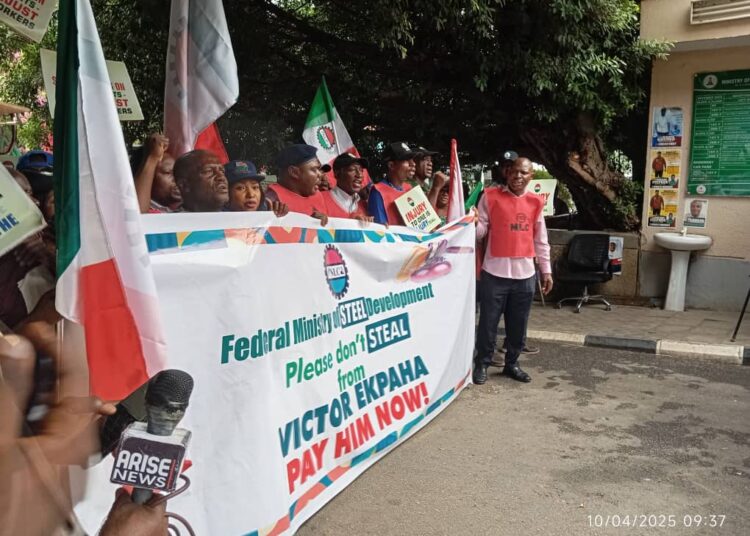The Nigeria Labour Congress (NLC) staged a picket at the Federal Ministry of Mines and Steel Development in Abuja on Thursday, effectively shutting down operations. This action was taken in response to the ministry’s failure to comply with a court judgment mandating the reinstatement of Comrade Victor Ekpaha, a staff member allegedly unlawfully dismissed two decades prior. The NLC’s demands extend beyond mere reinstatement, encompassing the full payment of Ekpaha’s outstanding salaries, allowances, and other accrued benefits for the entire 20-year period during which the case has been ongoing. This incident underscores the ongoing struggle for worker’s rights and the challenges in ensuring adherence to legal rulings within the Nigerian public sector.
The protracted nature of this case highlights the complexities and potential inefficiencies within the Nigerian judicial system. A 20-year legal battle for reinstatement raises questions about the effectiveness and timeliness of legal processes, particularly in labor disputes. The NLC’s direct action, in the form of a picket, suggests a frustration with the existing mechanisms for enforcing court judgments and protecting workers’ rights. This incident also brings into focus the broader issue of accountability within government ministries and the potential consequences of disregarding legal obligations.
The ministry’s failure to comply with the court order not only impacts the individual concerned, Comrade Ekpaha, but also undermines the authority of the judiciary and potentially erodes public trust in the legal system. The NLC’s intervention signifies a broader concern about the prevalence of such issues and the need for stronger mechanisms to ensure compliance with legal rulings. The financial implications of the demanded back payments, accumulating over two decades, further emphasize the gravity of the situation and the potential financial burden on the ministry.
This specific case reflects a larger pattern of labor disputes within Nigeria’s public sector. Such disputes often center on issues of unfair dismissal, unpaid wages and benefits, and lack of due process. The NLC plays a crucial role in advocating for workers’ rights and challenging perceived injustices. Their actions, such as the picket at the Ministry of Mines and Steel Development, serve as a visible demonstration of their commitment to protecting their members and holding government agencies accountable. These actions also highlight the importance of robust labor laws and effective enforcement mechanisms in maintaining a balanced and equitable employment environment.
Beyond the immediate demands regarding Comrade Ekpaha’s reinstatement and compensation, this incident raises broader questions about the relationship between government ministries and their employees, the role of labor unions in protecting workers’ rights, and the effectiveness of the Nigerian legal system in resolving labor disputes. The NLC’s decision to picket the ministry signals a determination to pursue all available avenues to ensure justice for its members and uphold the rule of law. This confrontation underscores the ongoing tension between workers’ rights and the power dynamics within government institutions.
The long-term implications of this case extend beyond the immediate parties involved. The outcome of the NLC’s actions could set a precedent for future labor disputes and influence how government ministries respond to court judgments. The incident also underscores the need for increased transparency and accountability within the public sector. A thorough investigation into the circumstances surrounding Comrade Ekpaha’s dismissal and the ministry’s subsequent failure to comply with the court order is crucial to ensure that similar situations are avoided in the future. This case serves as a timely reminder of the importance of upholding workers’ rights, respecting the rule of law, and promoting a just and equitable labor environment within Nigeria.














